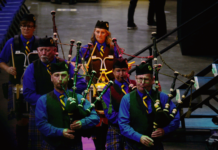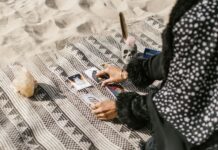For almost 10 years Shane Ortega has served as an influential figure in the LGBT community. Ortega has been on the forefront of advocacy; he was extremely influential in the repeal of “Don’t Ask, Don’t Tell,” co-founded the military support organization SPARt*A and is a serving member on the board of the organization, 41 percent. Most notably, Ortega is also the first openly transgender US soldier.
On Monday Nov. 13, Ortega spoke in HUB 302 at the ASPB hosted event “No One Left Behind.” He gave a TED Talk-style presentation that lasted about an hour, in front of an audience of about 70 people. The talk focused on Ortega’s experiences and anecdotes of his time as a serviceman and an activist. It had an inspirational and encouraging message of perseverance. Equality was another prevalent theme, with Ortega emphasizing a need for not just tolerance, but an understanding and respect of every individual as a human being.
One of the topics Ortega spoke on was his personal culture and identity. Ortega is Native American, and grew up on a reservation. He identifies as a two-spirit, which is a gender identity that ties into the Native American culture. It’s interesting to note that this culture is extremely open and accepting of transgenderism, with many tribes holding the notion that gender is not simply limited to male and female. In fact, as Ortega stated in his presentation, some Native American languages have over 200 words to define gender.
This is a drastic contrast to the military that Ortega joined at 18 years old, which he described as a very “hypermasculine and macho environment.” In a short anecdote, Ortega explained that his military enlistment was not entirely voluntary, as he was given the option of either jail or military service. He first served in the United States Marine Corps from 2005-2009, as a woman. He then served in the United States Army from 2009-2016; it was during this time that he transitioned while actively serving.
During Ortega’s time in the military, the US military had a very staunch attitude against homosexuality and transgenderism. For the first half of Ortega’ service the “Don’t Ask, Don’t Tell” (DADT) policy was in full effect. The policy, which is widely regarded now as discriminatory, prohibited openly gay, lesbian or bisexual individuals from serving in the armed forces. Ortega’s mother, who served in the US Army, suffered under this policy as a closeted lesbian.
It was not until 2011 that the policy was repealed, which is in large part thanks to Ortega’s pioneering as an openly transgender soldier. He went above and beyond the standards put before him, in order to prove that those in the LGBT community could serve as competently as any other heterosexual servicemember.
Ortega further advocated for the LGBT community by co-founding SPARt*A, an organization comprised of LGBT individuals who currently serve or have served in the military as well as their fellow serviceman who wish to support as allies. SPARt*A focuses on ensuring equal opportunity for service members in the military, regardless of their race, national origin, religion, sex, sexual orientation or gender identity.
He is also a sitting board member of the 41 percent organization, whose name stems from the statistic that 41 percent of all transgender people attempt suicide. It is a non-profit organization that focuses on supporting at-risk transgender adults, and preventing them from becoming a part of that horrible statistic.
Most recently Ortega has spoken out in opposition of President Trump’s ban on transgender troops in the military, calling the president’s actions “a completely egotistical move,” that “deflected and detracted away from the principles and good will of what it is to be an American service member.”
Following his presentation, Ortega encouraged the audience to support organizations such as the Veterans of Foreign Wars (VFW), which supports veterans and their mental health; as well as supporting local Indian reservations with their business.








